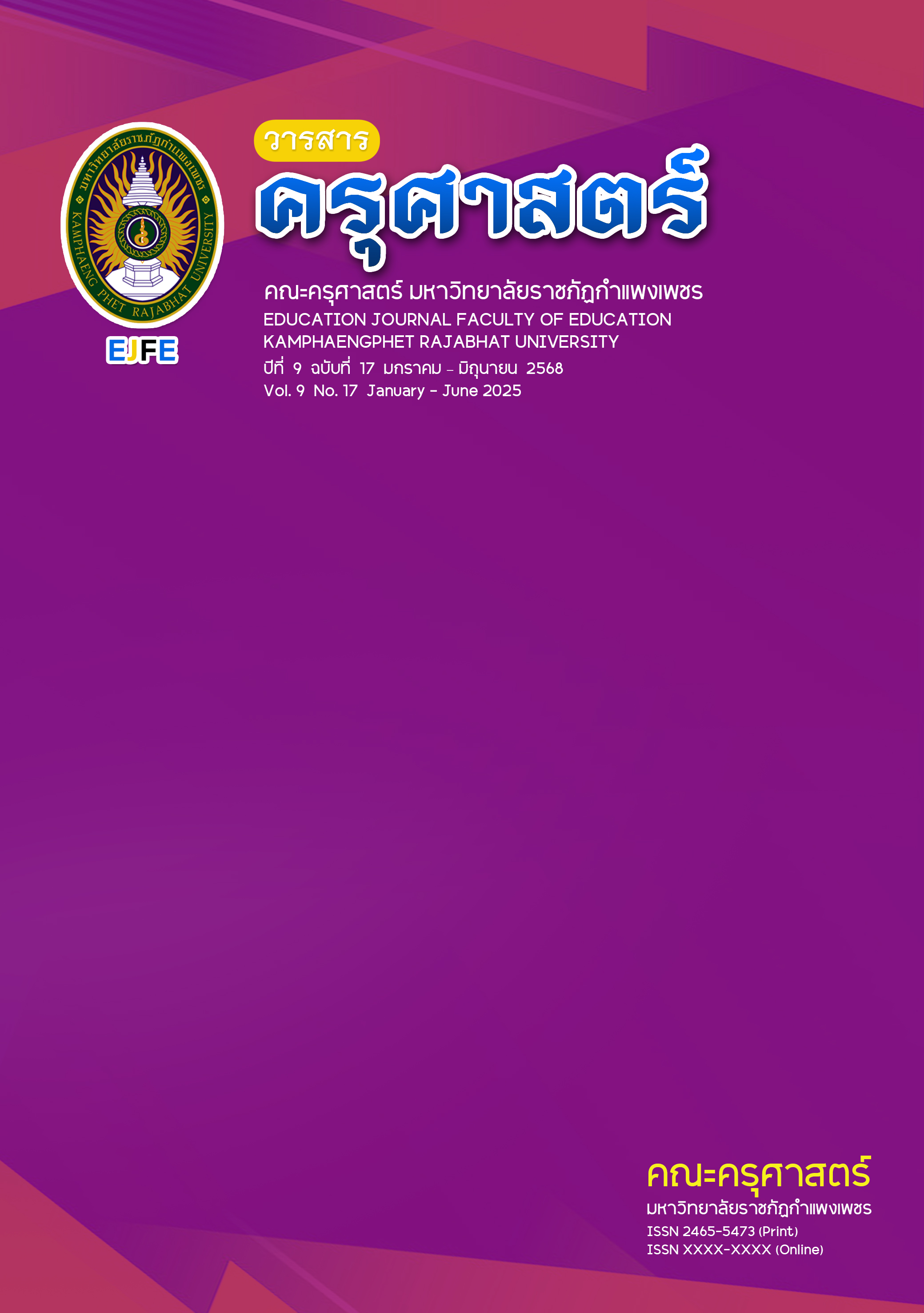A MODEL OF TEACHER DEVELOPMENT TO PROFESSIONAL TEACHER IN LEARNING MANAGEMENT TOWARDS PATRIOTISM, RELIGION, AND MONARCHY
Main Article Content
Abstract
The objectives of the research were 1) to develop model of teacher development to professional teacher in learning management towards patriotism, religion, and monarchy. First, researchers review significant documents to setup first draft of the model. After that, model development phrase, 7 experts review and judge the appropriateness of the model via model judgment form. Mean, standard deviation and content analysis was used to analyze the data. 2) to study the implementation effectiveness of professional teacher model. Target groups were divided to 2 group;
(1) experiment group were selected from 4 schools (13 teachers) and (2) compare group, 25 teachers which attended 38 Rajabhat University professional teacher development project, were volunteer selected. Model handbook, teaching plan evaluation form, teaching evaluation form, and learning effectiveness evaluation form were used to collect the data with reliability were 0.884, 0.828 and 0.789 respectively. Quantitative data was analyses with one-way MANOVA and Qualitative data used content analysis.
The results showed that: 1) The model consist of Principle, objective, process, provision to success, evaluation. 2) Implementation effectiveness, both of multivariate and univariate, between experiment group and compare group were not difference.
Article Details

This work is licensed under a Creative Commons Attribution-NonCommercial-NoDerivatives 4.0 International License.
CC Attribution-NonCommercial-NoDerivatives 4.0
References
ธร สุนทรายุทธ. (2551). การบริหารจัดการเชิงปฏิรูป ทฤษฎี วิจัยและปฏิบัติทางการศึกษา. กรุงเทพฯ: เนติกุลการพิมพ์.
มหาวิทยาลัยราชภัฏบ้านสมเด็จเจ้าพระยา. (2566). เอกสารประกอบการอบรมหลักสูตรการพัฒนาสมรรถนะครูสู่มืออาชีพ มหาวิทยาลัยราชภัฏ 38 แห่ง. วันที่ 2-4 ตุลาคม 2566 อาคารเรียนรวมสังคมศาสตร์ มหาวิทยาลัยราชภัฏวไลยอลงกรณ์.
เมตต์ เมตต์การุณ์จิต. (2553). การบริหารจัดการศึกษาแบบมีส่วนร่วม: ประชาชน องค์กรปกครองส่วนท้องถิ่นและราชการ. กรุงเทพฯ: บุ๊ค พอยท์.
ศิริวรรณ ฉัตรมณีรุ่งเรือง. (2566). การนิเทศการศึกษา และการใช้กระบวนการ DE. ใน สถาบันส่งเสริมการสอนวิทยาศาสตร์ และเทคโนโลยี (สสวท.). เอกสารประกอบการอบรมหลักสูตรพัฒนาศึกษานิเทศก์เพื่อเป็นพี่เลี้ยงวิชาการ วิทยาศาสตร์ คณิตศาสตร์และเทคโนโลยี ระดับสูง. ฝ่ายพัฒนาครูและบุคลากรทางการศึกษา สสวท.
สถาบันส่งเสริมการสอนวิทยาศาสตร์และเทคโนโลยี. (2563). หนังสือเรียนรายวิชาพื้นฐานวิทยาศาสตร์และเทคโนโลยี ชั้นมัธยมศึกษาปีที่ 2 เล่ม 1 : ตามมาตรฐานการเรียนรู้และตัวชี้วัด กลุ่มสาระการเรียนรู้วิทยาศาสตร์และเทคโนโลยี(ฉบับปรับปรุง พ.ศ. 2560) ตามหลักสูตรแกนกลางการศึกษาขั้นพื้นฐาน พุทธศักราช 2551 สถาบันส่งเสริมการสอนวิทยาศาสตร์และเทคโนโลยี. กรุงเทพฯ : โรงพิมพ์ สกสค. ลาดพร้าว.
สำนักงานคณะกรรมการการศึกษาขั้นพื้นฐาน และ มหาวิทยาลัยราชภัฏสุราษฎร์ธานี. (2567). รายงานการวิจัยเรื่องการพัฒนาและการใช้นวัตกรรมเพื่อพัฒนาคุณภาพการศึกษาด้วยรูปแบบ Active Learning ด้วยกระบวนการคิดขั้นสูงเชิงระบบ GPAS 5 Steps สำหรับครูสังกัดสำนักงานคณะกรรมการการศึกษาขั้นพื้นฐานพื้นที่ภาคใต้และภาคตะวันตก. สุราษฎร์ธานี: อุดมลาภการพิมพ์.
สำนักงานคณะกรรมการข้าราชการครูและบุคลากรทางการศึกษา. (2564). คู่มือการดำเนินการตามหลักเกณฑ์และวิธีการประเมินตำแหน่งและวิทยฐานะข้าราชการครูและบุคลากรทางการศึกษา ตำแหน่งครู. สำนักงาน ก.ค.ศ. กระทรวงศึกษาธิการ.
สิริพันธุ์ สุวรรณมรรคา. (2561). หน่วยที่ 6 ชุมชนแห่งการเรียนรู้ทางวิชาชีพเพื่อการพัฒนาการศึกษาในประมวลสาระชุดวิชานวัตกรรมการบริหารการศึกษาและภาวะผู้นำ. นนทบุรี: มหาวิทยาลัยสุโขทัยธรรมาธิราช.
สุณี บุญพิทักษ์. (2557). รูปแบบการพัฒนาศักยภาพครูทำวิจัยพัฒนาการเรียนรู้ปรัชญาเศรษฐกิจพอเพียงระดับการศึกษาขั้นพื้นฐาน. สักทอง: วารสารมนุษยศาสตร์และสังคมศาสตร์ (สทมส.), 20(1), 35-46.
Bell, S. (2010). Project-Based Learning for the 21st Century: Skills for the Future. The Clearing House: A Journal of Educational Strategies, Issues and Ideas, 83(2), 39–43. https://doi.org/10.1080/00098650903505415.
Hord, S. M. (1997). Professional learning communities: Communities of continuous inquiry and improvement. Southwest Educational Development Laboratory.
Hung, D., Tan, S. C., & Koh, T. S. (2006). Engaged learning: Making learning an authentic experience. In D. Hung & M. S. Khine (Eds.), Engaged learning with emerging technologies. Dordrecht.
Wang, F. and Hannafin, M.J. (2005). Design-based research and technology-enhanced learning environments. Educational Technology Research & Development, 53, 5-23. http://dx.doi.org/10.1007/BF02504682.


